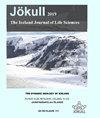The analog seismogram archives of Iceland: Scanning and preservation for future research
IF 0.3
4区 地球科学
Q4 GEOSCIENCES, MULTIDISCIPLINARY
引用次数: 3
Abstract
The history of seismography in Iceland began in 1909 with the installation of one horizontal Mainka seismograph in Reykjavík. Following a period of intermittent operation, regular operation was initiated in 1925 with the establishment of the Icelandic Meteorological Office. The number of stations increased gradually over the following decades, and in the sixties, four stations were in operation. The number of permanent stations proliferated following the Heimaey eruption in 1973 and during most of the eighties the number of stations was 40–50. The first digital seismograph stations were installed in 1990 and the analog seismic network was gradually replaced by digital stations over the next two decades. Between 1910 and 1920 the number of seismograms grew to an estimated 300,000. A four-year project to make this record collection accessible on the internet has been initiated and funded. So far around 175,000 seismograms have been scanned and the results are available and free for download on the open website seismis.hi.is. The seismograms are scanned with a resolution of 300 dpi and presented on the website as jpg-, and png-file. The high-resolution files are on the order of 4–8 Mb each. Digitization of the seismic traces has not been attempted since most of the seismograms are from short-period instruments and the waveforms are already lost. In addition to numerous teleseismic body-wave-phases, the record collection contains primary data from various tectonic and magmatic events in Iceland during the last century. This includes eruptions of Hekla in 1947, 1970, 1980–81, 1991 and 2000, Surtsey in 1963–1967, Heimaey in 1973, Askja in 1961, Grímsvötn in 1934, 1983, 1998, and 2004, Gjálp in 1996, rifting episode at Krafla in 1975–1984, persistent seismic activity of the Bárðarbunga and Katla volcanoes, numerous suspected subglacial magmatic events, earthquake swarms on the Reykjanes Peninsula Oblique Rift and within the Tjörnes Fracture Zone, and earthquake sequences in the transform zones of South and North Iceland and adjacent segments of the Mid-Atlantic Ridge.冰岛模拟地震记录档案:扫描与保存以备未来研究
冰岛地震学的历史始于1909年,当时在Reykjavík安装了一台水平的Mainka地震仪。经过一段断断续续的运作,1925年冰岛气象局成立后开始正常运作。在接下来的几十年里,台站的数目逐渐增加,在六十年代,有四个台站在运作。1973年Heimaey火山爆发后,永久观测站的数量激增,在80年代的大部分时间里,观测站的数量为40-50个。第一批数字地震仪台站于1990年安装,其后20年模拟地震台网逐渐被数字台站所取代。从1910年到1920年,地震记录的数量增长到大约30万份。一项为期四年的项目已经启动并获得资助,该项目旨在使这些唱片集可以在互联网上访问。到目前为止,已经扫描了大约17.5万个地震图,结果可以在公开网站seismis.hi.is上免费下载。地震图以300 dpi的分辨率扫描,并以jpg-和png文件在网站上显示。每个高分辨率文件大约有4-8 Mb。由于大多数地震记录来自短周期仪器,并且波形已经丢失,因此没有尝试将地震迹线数字化。除了许多远震体波相位外,记录收集还包含了上个世纪冰岛各种构造和岩浆事件的原始数据。这包括1947年、1970年、1980年至1981年、1991年和2000年的Hekla火山喷发,1963年至1967年的Surtsey火山喷发,1973年的Heimaey火山喷发,1961年的Askja火山喷发,1934年、1983年、1998年和2004年的Grímsvötn火山喷发,1996年的Gjálp火山喷发,1975年至1984年Krafla火山的裂谷事件,Bárðarbunga和Katla火山的持续地震活动,许多疑似冰下岩浆事件,雷克雅内斯半岛斜裂谷和Tjörnes断裂带内的地震群,以及冰岛南部和北部转换带以及大西洋中脊邻近部分的地震序列。
本文章由计算机程序翻译,如有差异,请以英文原文为准。
求助全文
约1分钟内获得全文
求助全文
来源期刊

Jokull
地学-地球科学综合
自引率
22.20%
发文量
1
审稿时长
1 months
期刊介绍:
Jökull publishes research papers, notes and review articles concerning all aspects of the Earth Sciences. The
journal is primarily aimed at being an international forum
for geoscience research in Iceland. Specific areas of coverage include glaciology, glacial geology, physical geography,
general geology, petrology, volcanology, geothermal research, geophysics, meteorology, hydrology and oceanography. Jökull also publishes research notes and reports from
glacier expeditions, book reviews, and material of interest to
the members of the Icelandic Glaciological and Geological
Societies
 求助内容:
求助内容: 应助结果提醒方式:
应助结果提醒方式:


